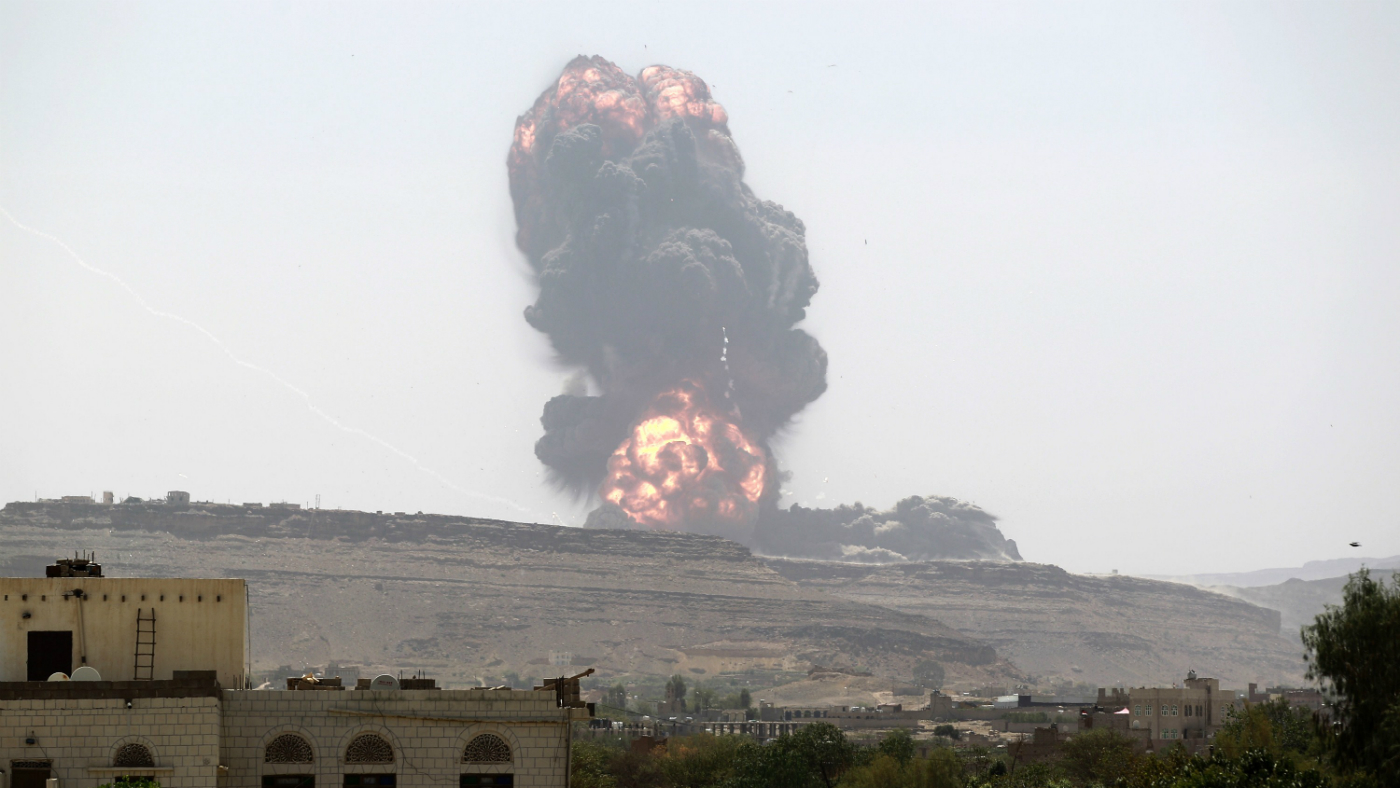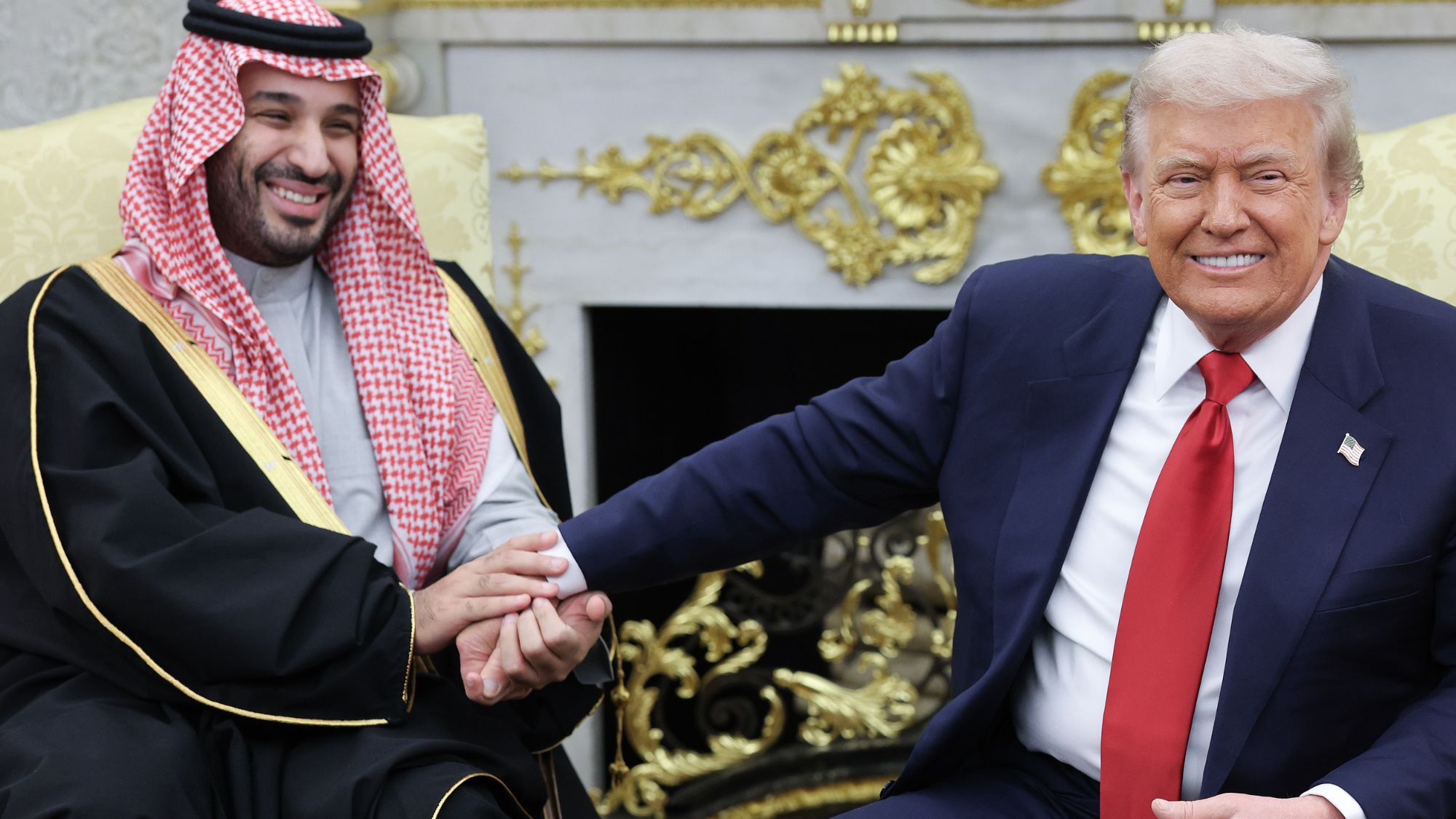The truth about UK arms deals with Saudi Arabia
After MEPs vote to end sales of weapons to the Saudi government, we examine how the arms have been used

A free daily email with the biggest news stories of the day – and the best features from TheWeek.com
You are now subscribed
Your newsletter sign-up was successful
Members of the European Parliament on have unanimously called for “an EU-wide arms embargo on Saudi Arabia” after the murder of Saudi journalist Jamal Khashoggi at the Saudi consulate in Istanbul three weeks ago.
According to a statement issued by MEPs, the parliament “deplores the significant arms deals by EU member states, among others Spain, France, Germany, Belgium and the United Kingdom, with Saudi Arabia,” And it “calls, once again, for an EU-wide ban on the export, sale, update and maintenance of any form of security equipment to Saudi Arabia, which can be or is used for repression.”
Theresa May has been under pressure to halt arms sales to Saudi Arabia for a number of years after human rights groups and charities suggested the UK may be aiding alleged violations of international humanitarian law by the Saudi-led coalition in Yemen.
The Week
Escape your echo chamber. Get the facts behind the news, plus analysis from multiple perspectives.

Sign up for The Week's Free Newsletters
From our morning news briefing to a weekly Good News Newsletter, get the best of The Week delivered directly to your inbox.
From our morning news briefing to a weekly Good News Newsletter, get the best of The Week delivered directly to your inbox.
Germany has already halted all arms sales to the country, but even in the wake of the killing of Khashoggi, May has resisted calls to follow suit. Conservative MEPs abstained from the vote in the European Parliament.
Philippe Lamberts, the Belgian leader of the Green grouping of parties which tabled the resolution, said: “Brexit must not be an excuse for the UK to abdicate on its moral responsibilities.
“Theresa May must prove that she is willing to stand up to the kind of repugnant behaviour shown by the killing of Khashoggi and halt arms sales to Saudi Arabia immediately.”
How much are the deals worth?
A free daily email with the biggest news stories of the day – and the best features from TheWeek.com
According to The Stockholm International Peace Research Institute, the UK was the sixth-biggest arms dealer in the world in 2017, and the second-largest exporter of arms to Saudi Arabia, behind the US.
This is reflective of a large spike in sales last year. While the government does not provide values for deliveries of arms exports, it does publish information on the values of granted export licences, and the latest figures reveal that UK military sales to Saudi Arabia increased by two thirds in 2017 from 2016, amounting to an increase of more than £450m in sales.
Sky News reports that the UK “issued 126 licences relating to military goods in 2017, with a value of £1.129bn”, compared with 103 licences relating to military goods in 2016, with a value of £679m.
After Saudi Arabia intervened in the civil war in Yemen in early 2015, the UK approved more than £3.3bn in military sales to the kingdom between April 2015 and September 2016, according to the Campaign Against the Arms Trade.
This included £2.2bn worth of licences for aircraft, helicopters and drones, and £1.1bn for grenades, bombs and missiles.
Are British-made weapons used in Yemen?
A Saudi-led coalition is using airstrikes against Yemeni rebels and their allies, who drove a Saudi-backed and internationally recognised government into exile in 2015. The rebels are reportedly backed by Iran.
Two years ago, the UN published a report declaring that the Saudi-led coalition is guilty of serious breaches of international humanitarian law by deliberately targeting civilians.
In July last year, however, the High Court in London dismissed a claim to have UK arms sales to Saudi Arabia ruled illegal, deciding that the government acted rationally and lawfully when it refused to suspend export licences for the sale or transfer of arms and military equipment to Saudi Arabia for use in the conflict in Yemen.
This is despite the fact that in 2016, a leaked parliamentary committee report concluded that it was likely that British weapons had been used by the Saudi-led coalition to violate international law, and that Typhoon and Tornado aircraft, manufactured by BAE Systems, have been used in combat missions in Yemen.
Misleading and incomplete documentation means that the exact death toll of the Yemen conflict is difficult to gauge. Some estimates compiled by The Washington Post have put the death toll as high as 50,000, with millions more displaced.
Why has the UK continued to supply weapons?
Theresa May’s government has repeatedly rejected calls to end sales, stressing the importance of upholding good relations with the UK's key ally in the Middle East.
Foreign Secretary Jeremy Hunt has said there will be “consequences to the relationship with Saudi Arabia” after the killing of Khashoggi, but he has also said the UK has an important strategic relationship with Riyadh that it needs to protect, The Guardian reports.
The UK’s impending exit from the EU has played a key role, according to some experts and campaign groups. CAAT says Theresa May’s “search for post-Brexit trade deals has seen an unwelcome focus on selling arms to some of the world's most repressive regimes”.
On the other side of the debate, ADS Group, a trade body for defence and aerospace companies, told Bloomberg in 2016 that “Brexit provides the circumstances and the catalyst for faster and more efforts”.
The government also argues that it has one of the strictest licensing procedures in the world, with safeguards in place to ensure against improper use.
Other Western countries would “happily supply arms” to Saudi Arabia “with nothing like the same compunctions or criteria or respect for humanitarian law”, former foreign secretary Boris Johnson argued during his tenure.
“[But] one of the main questions is if those buyer checks are being carried out properly,” the BBC says.
Campaigners argue that there is clear evidence that they are not.
-
 The Gallivant: style and charm steps from Camber Sands
The Gallivant: style and charm steps from Camber SandsThe Week Recommends Nestled behind the dunes, this luxury hotel is a great place to hunker down and get cosy
-
 The President’s Cake: ‘sweet tragedy’ about a little girl on a baking mission in Iraq
The President’s Cake: ‘sweet tragedy’ about a little girl on a baking mission in IraqThe Week Recommends Charming debut from Hasan Hadi is filled with ‘vivid characters’
-
 Kia EV4: a ‘terrifically comfy’ electric car
Kia EV4: a ‘terrifically comfy’ electric carThe Week Recommends The family-friendly vehicle has ‘plush seats’ and generous space
-
 Local elections 2026: where are they and who is expected to win?
Local elections 2026: where are they and who is expected to win?The Explainer Labour is braced for heavy losses and U-turn on postponing some council elections hasn’t helped the party’s prospects
-
 How corrupt is the UK?
How corrupt is the UK?The Explainer Decline in standards ‘risks becoming a defining feature of our political culture’ as Britain falls to lowest ever score on global index
-
 The high street: Britain’s next political battleground?
The high street: Britain’s next political battleground?In the Spotlight Mass closure of shops and influx of organised crime are fuelling voter anger, and offer an opening for Reform UK
-
 ‘If regulators nix the rail merger, supply chain inefficiency will persist’
‘If regulators nix the rail merger, supply chain inefficiency will persist’Instant Opinion Opinion, comment and editorials of the day
-
 Biggest political break-ups and make-ups of 2025
Biggest political break-ups and make-ups of 2025The Explainer From Trump and Musk to the UK and the EU, Christmas wouldn’t be Christmas without a round-up of the year’s relationship drama
-
 ‘The menu’s other highlights smack of the surreal’
‘The menu’s other highlights smack of the surreal’Instant Opinion Opinion, comment and editorials of the day
-
 Is a Reform-Tory pact becoming more likely?
Is a Reform-Tory pact becoming more likely?Today’s Big Question Nigel Farage’s party is ahead in the polls but still falls well short of a Commons majority, while Conservatives are still losing MPs to Reform
-
 The US-Saudi relationship: too big to fail?
The US-Saudi relationship: too big to fail?Talking Point With the Saudis investing $1 trillion into the US, and Trump granting them ‘major non-Nato ally’ status, for now the two countries need each other